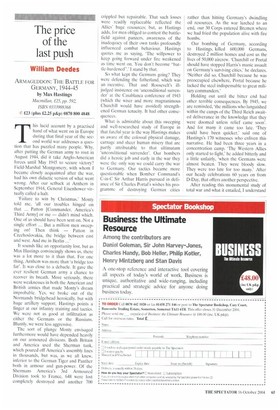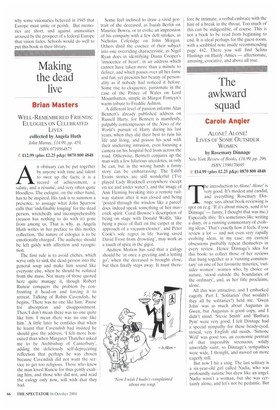The price of the last push
William Deedes
ARMAGEDDON: THE BATTLE FOR GERMANY, 1944-45 by Max Hastings Macmillan, £25, pp. 592.
ISBN 0333908368 £23 (plus £2.25 p&p) 0870 800 4848
This lucid account by a practised hand of what went on in Europe during that final year of the second world war addresses a question that has puzzled many people. Why, after putting the German army to rout in August 1944, did it take Anglo-American forces until May 1945 to secure victory? Field-Marshal Montgomery, with whom I became closely acquainted after the war, had his own didactic version of what went wrong. After our setback at Arnhem in September 1944, General Eisenhower virtually called a halt.
'Failure to win by Christmas,' Monty told me, 'all our troubles hinged on that ... Patton [Commander, America's Third Army] or me — didn't mind which. One of us should have been sent on. Not a single effort ... But a million men sweeping on! Then think — Patton in Czechoslovakia, the bridge between east and west. And mc in Berlin ...'
It sounds like an opportunity lost, but as Max Hastings convincingly shows us, there was a lot more to it than that. For one thing. Arnhem was more than 'a bridge too far'. It was close to a debacle. It gave the ever resilient German army a chance to recover its breath. More seriously, there were weaknesses in both the American and British armies that made Monty's dream improbable. Yes, we broke out of the Normandy bridgehead heroically, but with huge artillery support. Hastings points a finger at our infantry training and tactics. We were not as good at infiltration as either the Germans or the Russians. Bluntly, we were less aggressive.
The sort of plunge Monty envisaged furthermore would have depended heavily on our armoured divisions. Both Britain and America used the Sherman tank, which poured off America's assembly lines in thousands, but was, as we all knew, inferior to the German Tiger and Panther both in armour and gun-power. Of the Shermans America's 3rd Armoured Division took to France, 648 were lost completely destroyed and another 700 crippled but repairable. That such losses were readily replaceable reflected the Allies' huge resources; but, as Hastings adds, for men obliged to contest the battlefield against panzers, awareness of the inadequacy of their own tanks profoundly influenced combat behaviour. Hastings quotes me as saying, 'The willpower to keep going forward under fire weakened as time went on. You don't become "battle-hardened".' I stand by that.
So what kept the Germans going? They were defending the fatherland, which was an incentive. That and Roosevelt's illjudged insistence on 'unconditional surrender' at the Casablanca conference of 1943 (which the wiser and more magnanimous Churchill would have avoided) strengthened German tenacity. It had other consequences.
What is admirable about this sweeping and well-researched study of Europe in that fateful year is the way Hastings makes us aware of the colossal physical damage, carnage and sheer human misery that are partly attributable to that ultimatum 'unconditional surrender'. Our bombers did a heroic job and early in the war they were the only way we could carry the war to Germany. Our tactics became more questionable when Bomber Command's C-in-C Sir Arthur Harris pursued in defiance of Sir Charles Portal's wishes his programme of destroying German cities rather than hitting Germany's dwindling oil resources. As the war lurched to an end, our 30 Corps entered Bremen where we had fried the population alive with fire bombs.
Our bombing of Germany, according to Hastings, killed 600,000 Germans, destroyed 2 million homes and cost us the lives of 50,000 aircrew. 'Churchill or Portal should have stopped Harris's manic assault on Germany's surviving cities,' he declares. 'Neither did so, Churchill because he was preoccupied elsewhere, Portal because he lacked the steel indispensable to great military commanders.'
Holding out until the bitter end had other terrible consequences. By 1945, we are reminded, 'the millions who languished within the camps of the Third Reich awaited deliverance in the knowledge that they were doomed unless relief came soon'. And for many it came too late. 'They could have been quicker,' said one of Hastings's 170 witnesses who enliven this narrative. He had been three years in a concentration camp. The Western Allies only started to fight,' he added bitterly and a little unfairly, 'when the Germans were almost beaten. They were bloody slow. They were too late for too many.' After our heady celebrations 60 years on from D-Day, that offers another perspective.
After reading this monumental study of total war and what it entailed, I understand why some visionaries believed in 1945 that Europe must unite or perish. But memories are short, and against animosities aroused by the prospect of a federal Europe that vision fades. Schools would do well to put this book in their library.











































































































 Previous page
Previous page